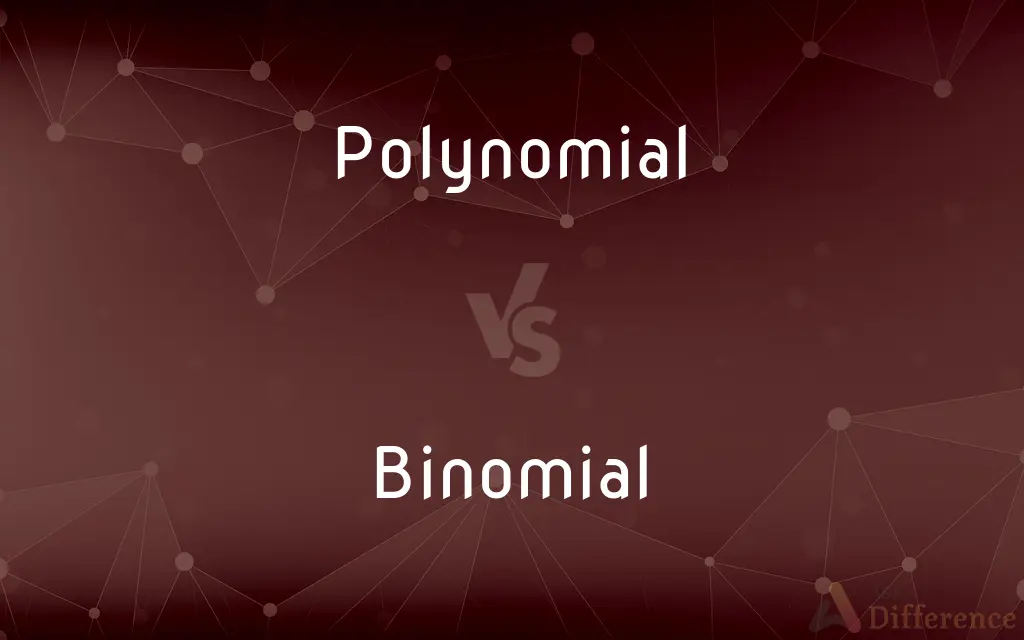Polynomial vs. Binomial — What's the Difference?
By Fiza Rafique & Maham Liaqat — Updated on March 28, 2024
A polynomial is an algebraic expression with one or more terms, while a binomial has exactly two terms.

Difference Between Polynomial and Binomial
Table of Contents
ADVERTISEMENT
Key Differences
A polynomial is an algebraic expression consisting of variables, coefficients, and exponents, arranged in a finite series of terms. It can have one or multiple terms, making it a versatile expression in algebra. Whereas a binomial is a specific type of polynomial that contains exactly two terms, separated by either a plus or minus sign, highlighting its simplicity and specificity within the broader category of polynomials.
Polynomials are classified based on the number of terms they contain: monomials (one term), binomials (two terms), and trinomials (three terms), among others. This classification system emphasizes the diversity within polynomials. On the other hand, binomials are always composed of two terms, showcasing a uniform structure that simplifies certain algebraic operations like addition, subtraction, and multiplication.
The degree of a polynomial is determined by the highest power of its variable. Polynomials can have any degree, which affects their behavior and the shape of their graphs. In contrast, the degree of a binomial also follows this rule but is directly related to its two terms, which may result in a simpler expression to analyze, especially when performing operations like differentiation or integration.
Polynomials play a crucial role in various areas of mathematics and science, such as calculus, algebra, and physics, due to their ability to model complex relationships and behaviors. Binomials, while a subset of polynomials, are particularly notable in binomial expansions and the Binomial Theorem, which provides a powerful tool for expanding expressions raised to a power.
When it comes to solving equations, polynomials can be more challenging, especially as their degree increases. Solutions to polynomial equations may include real or complex numbers, and higher degrees may require sophisticated methods for finding all solutions. Binomials, with their two-term structure, can sometimes offer a more straightforward path to solutions, depending on the specific terms and their coefficients.
ADVERTISEMENT
Comparison Chart
Definition
An algebraic expression with one or more terms.
A polynomial with exactly two terms.
Number of Terms
Can vary widely (one, two, three, etc.).
Always two.
Degree
Determined by the highest power of the variable; can be any degree.
Follows the polynomial rule but generally simpler.
Usage
Wide-ranging in mathematics and science for modeling complex behaviors.
Often used in binomial expansions and the Binomial Theorem.
Compare with Definitions
Polynomial
Degree varies.
The degree of a polynomial is determined by its highest exponent.
Binomial
Consisting of two names or terms;
Binomial nomenclature
Polynomial
Can have any number of terms.
Polynomials include monomials, binomials, and trinomials.
Binomial
Useful in specific theories.
The Binomial Theorem greatly simplifies binomial expansions.
Polynomial
Foundational in mathematics.
Polynomials are essential for functions, calculus, and algebra.
Binomial
Easier equation solving.
Solving a binomial equation is often more straightforward.
Polynomial
Equation solving can be complex.
Finding roots of a polynomial can involve sophisticated techniques.
Binomial
Simpler degree.
The degree of a binomial is easy to identify.
Polynomial
In mathematics, a polynomial is an expression consisting of variables (also called indeterminates) and coefficients, that involves only the operations of addition, subtraction, multiplication, and non-negative integer exponentiation of variables. An example of a polynomial of a single indeterminate x is x2 − 4x + 7.
Binomial
Always has two distinct terms.
Binomials are used in binomial expansions.
Polynomial
Of, relating to, or consisting of more than two names or terms.
Binomial
Consisting of or relating to two names or terms.
Polynomial
A taxonomic designation consisting of more than two terms.
Binomial
(Mathematics) A polynomial with two terms.
Polynomial
An algebraic expression consisting of one or more summed terms, each term consisting of a constant multiplier and one or more variables raised to nonnegative integral powers. For example, x2 - 5x + 6 and 2p3q + y are polynomials. Also called multinomial.
Binomial
(Biology) A taxonomic name in binomial nomenclature.
Polynomial
An expression of two or more terms.
Binomial
Consisting of two terms, or parts.
Polynomial
An expression consisting of a sum of a finite number of terms, each term being the product of a constant coefficient and one or more variables raised to a non-negative integer power, such as . Category:en:Polynomials
Binomial
(statistics) Of or relating to the binomial distribution.
Polynomial
(taxonomy) A taxonomic designation (such as of a subspecies) consisting of more than two terms.
Binomial
(algebra) A polynomial with two terms. Category:en:Polynomials
Polynomial
(algebra) Able to be described or limited by a polynomial.
Binomial
(algebra) A quantity expressed as the sum or difference of two terms.
Polynomial
(taxonomy) of a polynomial name or entity
Binomial
(taxonomy) A scientific name at the rank of species, with two terms: a generic name and a specific name.
Polynomial
An expression composed of two or more terms, connected by the signs plus or minus; as, a2 - 2ab + b2.
Binomial
An expression consisting of two terms connected by the sign plus (+) or minus (-); as, a + b, or 7 - 3.
Polynomial
Containing many names or terms; multinominal; as, the polynomial theorem.
Binomial
Consisting of two terms; pertaining to binomials; as, a binomial root.
Polynomial
Consisting of two or more words; having names consisting of two or more words; as, a polynomial name; polynomial nomenclature.
Binomial
Having two names; - used of the system by which every animal and plant receives two names, the one indicating the genus, the other the species, to which it belongs.
Polynomial
A mathematical expression that is the sum of a number of terms
Binomial
A quantity expressed as a sum or difference of two terms
Binomial
Relating to binomials;
Binomial expression
Common Curiosities
How does a binomial differ from a polynomial?
A binomial is a type of polynomial with exactly two terms, making it a subset of polynomials with a specific structure.
What makes binomials unique within polynomials?
Binomials are unique because they consist of exactly two terms, simplifying certain operations and theories, like the Binomial Theorem.
What is a polynomial?
A polynomial is an algebraic expression containing one or more terms, where each term includes a variable raised to a non-negative integer exponent.
Can a polynomial have any degree?
Yes, polynomials can have any degree, which is determined by the highest exponent of the variable in the expression.
How are polynomials used in real life?
Polynomials model complex behaviors in physics, economics, and engineering, such as motion, growth, and financial calculations.
What is the significance of the degree of a binomial?
The degree of a binomial affects its graph and the complexity of operations like differentiation and integration.
Are all binomials polynomials?
Yes, all binomials are polynomials, specifically polynomials with two terms.
How do you solve a polynomial equation?
Solving polynomial equations can involve factoring, graphing, or using the quadratic formula for second-degree polynomials, among other methods.
What is the Binomial Theorem?
The Binomial Theorem provides a formula for expanding expressions that are raised to a power, specifically applicable to binomials.
What challenges arise in solving higher-degree polynomial equations?
Higher-degree polynomial equations can present challenges due to their complex roots and the need for advanced solving techniques.
Can polynomials represent real-world situations?
Yes, polynomials can represent a wide range of real-world situations, offering solutions to problems in various scientific and mathematical fields.
Do binomials have a special role in mathematics?
Yes, binomials play a special role in simplifying expressions and calculations, especially evident in the Binomial Theorem.
Why are binomials and polynomials important in algebra?
Binomials and polynomials form the basis for understanding algebraic expressions, equations, and functions, crucial for advanced mathematical concepts.
Can the degree of a polynomial affect its graph?
Yes, the degree of a polynomial significantly affects the shape and behavior of its graph.
How does the structure of a binomial affect its properties?
The two-term structure of a binomial simplifies its properties, making it easier to manipulate and understand than polynomials with more terms.
Share Your Discovery

Previous Comparison
Archaeology vs. Paleontology
Next Comparison
Business vs. ProfessionAuthor Spotlight
Written by
Fiza RafiqueFiza Rafique is a skilled content writer at AskDifference.com, where she meticulously refines and enhances written pieces. Drawing from her vast editorial expertise, Fiza ensures clarity, accuracy, and precision in every article. Passionate about language, she continually seeks to elevate the quality of content for readers worldwide.
Co-written by
Maham Liaqat















































